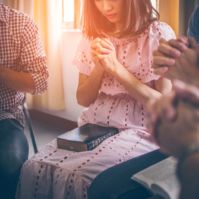 Restrictions on social gatherings in the United States are starting to ease up in many areas as the health risks created by the novel coronavirus pandemic start to lessen, but things aren’t going to go completely back to normal just yet. There are still limits to what people can safely do, especially where potentially large groups of people in indoor spaces are concerned. There are a lot of questions about what is safe and what creates a hotbed for the spread of COVID-19. Some people claim that staying away from traditional church gatherings hurts their faith, while others insist that religious worship can and should go beyond simply attending church services to embody more of the worshiper's everyday life.
Restrictions on social gatherings in the United States are starting to ease up in many areas as the health risks created by the novel coronavirus pandemic start to lessen, but things aren’t going to go completely back to normal just yet. There are still limits to what people can safely do, especially where potentially large groups of people in indoor spaces are concerned. There are a lot of questions about what is safe and what creates a hotbed for the spread of COVID-19. Some people claim that staying away from traditional church gatherings hurts their faith, while others insist that religious worship can and should go beyond simply attending church services to embody more of the worshiper's everyday life.
The Importance of Church
Of course, church services do have an important role to play in many religions. There’s a reason many faithful members consider them to be an integral part of their faith. Religious gatherings inspire learning and camaraderie and help communities of worshipers to connect and grow together. A church can act as both a central point of direction and a support group for members, and during challenging times such as these, it may be especially difficult to go without those connections.
The timing of the shutdown in many countries was especially unfortunate, as it overlapped with important religious dates such as Easter. Instead of being able to participate in traditions and festivities, people were faced with uncertainty and fear as COVID-19 spread across the globe. As the pandemic drags on, many people have understandably become impatient and eager to return to a sense of normalcy.
Religion Without Church
Religious gatherings may create an amazing experience, but large church services don't necessarily have to happen constantly for people to continue to be devout followers. Many churches have adapted to circumstances, and many members continue to distance themselves despite easing restrictions out of interest for protecting their health. Some Christians have cited Bible passages, including one from the book of Matthew, “For where two or three gather in my name, there am I with them," to support the argument that they can remain faithful as well as socially distant. While online services may not be the same as going to church, many have used the time as an opportunity to work on being more devout in their daily lives and grow closer to their immediate families.
Weighing the Risks and Rewards
The biggest legal argument being made against the closure of churches in the United States is that doing so violates peoples’ freedom of religion. Opponents of this argument state that using this constitutional right in circumstances such as this is morally wrong and goes against the spirit of the idea of religious freedom. In some cases, they refer to other times when freedom of religion has been used for contentious reasons, such as preventing gay marriage and denying reproductive rights to women. While these issues can be touchy subjects, the right decision for the government to make in any of these cases can boil down to a matter of interpretation of what religious freedom really means.
There's a reason religions hold church services, and there's no denying that they can be a powerful experience for faithful members. While the changes that have been put in place have been difficult, they have ultimately been implemented in an attempt to keep people safe. Easing restrictions on large gatherings could justify a slow return to a normal routine, but many experts argue that it needs to be done with caution. There is a good argument to be made that religion can go beyond church and that worshipers can use this time as an opportunity to develop themselves through distant, more personal study and bonding with close family. Patience may be one of the most valuable virtues in this situation and could help keep thousands of people protected from COVID-19.



